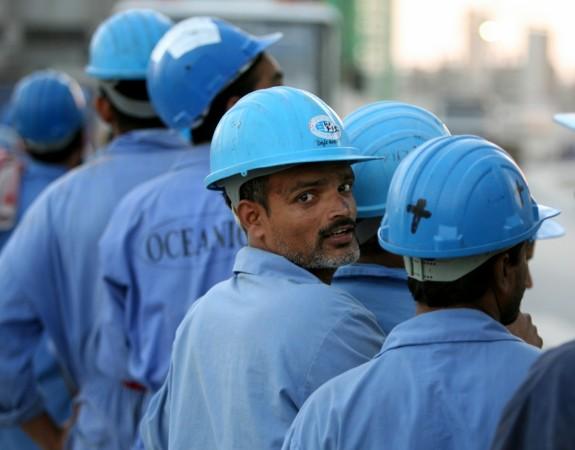
As global oil prices crashed and migrant workers faced challenging work conditions in the Gulf countries, India's remittances from the region fell for a second straight year to $34.67 billion in 2015, reported the Business Standard. The inflows touched $35.49 billion in 2013 and fell by nearly half a billion each year since then.
The remittance sending gulf nations generally include the UAE, Kuwait, Saudi Arabia, Oman and Qatar.
If crude prices stabilised at $50 a barrel, it could stable the inflows of remittance from the Gulf, notes Debasish Mishra, partner at Deloitte Touche Tohmatsu India. However, he added the Middle East nations are "increasingly encouraging participation of natives in the workforce, to prepare for oil prices to remain at these levels for long term."
The Saudi government recently announced the roll out of its second phase of Nitaqat Law, which allows for reservation of jobs to native Saudis. Another controversial decision of levying tax on the personal income of the migrant workers was also being mulled about. Third, cheap labour from Bangladesh and Nepal are drawing away Gulf employers from costly Indian workers, said the daily.
A survey by GulfTalent, an online recruitment portal in the Middle East, revealed that 14 percent of Saudi-based private firms would likely cut jobs in 2016. It said Oman, UAE, Qatar will cut 10 percent, nine percent and eight percent of jobs, respectively, in their economies, putting more pressure on migrants workers.
India's labour laws trying to fix a minimum wage for Indian workers going abroad to work too might affect the inflow of the corpus, said India bound consultants and recruiting agents. However, the laws have been necessary to contain the exploitation of Indian workers overseas.
As reported by the Business Standard, citing December 2015 figures, in the past year alone 5,900 Indian workers lost their lives, with maximum deaths reported from Saudi Arabia (2,691) and the UAE (1,540). It added that 7,500 Indians complained of exploitation and torture by employers in the Gulf. Kuwait, followed by Saudi Arabia and Bahrain, registered the highest complaints of 3,236, 2,472 and 806, respectively. The Indian missions in Oman, Qatar and the UAE received 413, 378 and 126 complaints each.
Recruiting agencies, however, said the complaints have barely impacted their consultancy business. Wakeel Ansari, president of Delhi's association of recruiting agents, told the news outlet that there might be genuine cases of harassment but those could happen in any country. "The number of complaints is not even one percent of the 7.3 million Indians residing in the Gulf," he said, and added that the luxury offered in those places won't let them return back.









!['Had denied Housefull franchise as they wanted me to wear a bikini': Tia Bajpai on turning down bold scripts [Exclusive]](https://data1.ibtimes.co.in/en/full/806605/had-denied-housefull-franchise-they-wanted-me-wear-bikini-tia-bajpai-turning-down-bold.png?w=220&h=138)



